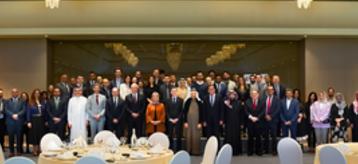Powerful driver of economic growth
Bahrain has maintained its status as a regional financial centre, even with increasing competition from its GCC neighbours. With financial technology developing rapidly, and profits, soundness indicators and asset growth remaining healthy, Bahrain's banking system is well-positioned to continue leading non-oil growth and diversification in the country. Assets and profits have risen in recent years, with listed banks recording strong lending growth. The percentages of delinquent and non-performing loans have declined, even though the overall mortgage and credit card lending has increased.
Bahrain's banking system consists of both conventional and Islamic banks and is the largest component of the financial systems, accounting for over 85 per cent of total financial assets. There are a total of 376 financial sector institutions in the country as of the end of September 2020 including 31 retail banks, 62 wholesale banks, 17 branches of foreign banks and eight representative offices of banks. These also include 34 insurance companies, 53 investment business firms and 86 specialised licensees.
The banking sector has played a pivotal role in the emergence of Bahrain as a leading financial centre in the region. As of July 2020, banking sector assets stood at over $212 billion, more than five times the annual GDP of Bahrain.
Industry growth has been supported by an open market economy, stable and prudent macro-economic and fiscal policies, a credible regulatory framework in line with international standards and a well-qualified local and expat workforce. All these factors have combined to cement Bahrain's position as a regional banking hub, successfully attracting numerous foreign banking organisations to establish their presence in the country.
The importance of financial services for Bahrain's economy goes well beyond Bahrain's Economic Vision 2030, which focuses on shaping the vision of the government, society and the economy, based around three guiding principles; sustainability, fairness and competitiveness. It was the first GCC country to begin diversification efforts, and much of its success in this regard is owed to its thriving financial services sector. The country was able to build one of the region's most dynamic and pioneering fintech ecosystems. It built the region's first onshore fintech regulatory Sandbox, where 32 innovative fintechs from all over the world are testing their technologies today.
Covid-19 has served as a catalyst for digital transformation across a range of sectors, and this is particularly true for financial services and fintech. But it is worth noting that while the pandemic has served as a catalyst for digitisation across the financial services sector, this was a revolution that was already taking place. Banks like Bank ABC launched ila Bank,
Bahrain's fast-growing digital mobile-only bank, which has now introduced ila Premium, a bespoke offering customised to enrich the lifestyles of the experience generation. With the upgrade to ila Premium, customers can unlock a wide array of exciting local and global benefits as well as a customised banking experience, which includes higher interest rates, discounts on transaction fees and charges, over 1,000 airport lounge access worldwide, insurance benefits such as travel, gadget, e-commerce protection and much more. It is the only subscription-based model in the Kingdom of Bahrain and is tailor-made for customers to easily avail of competitive banking benefits such as discounts on fees and charges, preferential interest and foreign exchange rates and higher transaction limits.
Convenience also plays a huge role today. Every generation looks forward to one step less in every process. Arab Financial Services (AFS), the region's leading digital payments and fintech solutions provider, is driven by its customer focus and a commitment to delivering simpler, more secure and convenient payment experiences. AFS exists to empower businesses and individuals by exploring and investing in superior technologies that help shape the future of financial experiences and how they are conducted: anytime, anywhere and anyhow. Anticipating a customer shift to digital payments, in 2019, AFS released the first Android-based NFC point of sale (PoS) terminals in Bahrain which were all-in-one payment solutions that support international and domestic payment schemes and fintech payment options. Their introduction in the market proved highly successful as the Covid-19 pandemic significantly accelerated the shift towards digital payments. Last year, AFS was the first acquirer in Bahrain to introduce local transaction tokenisation on PoS and was the first in Bahrain to accept contactless cards in compliance with the Central Bank mandate on expenditure limits on contactless transactions. Tapping into further opportunities that the pandemic delivered, AFS' eCommerce and eInvoicing acquiring products were launched just as online payments took off that year. They also entered into strategic partnerships with stc Bahrain to rollout the all-in-one fully integrated stc Tajer PoS solution for retail businesses and SMEs.
..
Source: https://www.khaleejtimes.com/supplements/powerful-driver-of-economic-growth


